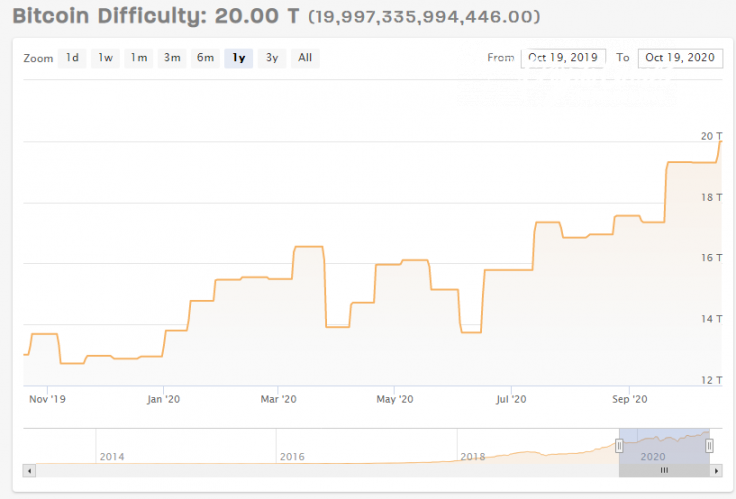Major network activity metrics of the flagship blockchain are on fire despite a series of "black swans" in October. The next periodic adjustment may bring Bitcoin (BTC) mining difficulty over 20,000,000,000,000 for the first time ever.
Bitcoin (BTC) mining difficulty spikes to new all-time high
According to publicly available explorers for the Bitcoin (BTC) blockchain, the last mining difficulty adjustment added 3.62 percent to its previous level. After this adjustment, this metric is estimated at 19,997,335,994,446. Despite this adjustment, it is very far from being the most powerful in a turbulent 2020. It allowed Bitcoin (BTC) mining difficulty to print a new all-time high.

Thus, Bitcoin (BTC) network difficulty added 54 percent in the last nine months. In 2020, the flagship blockchain witnessed two double-digit adjustments in terms of this crucial metric. On June 16, network difficulty surged 14.95 percent, while on Sept. 20, it gained 11.35 percent.
The most powerful negative adjustment of Bitcoin (BTC) mining difficulty was registered after Black Thursday in Crypto and stole 15.95 percent of the difficulty.
Bitcoin (BTC) mining difficulty is a relative value that demonstrates how difficult it is to calculate one hash while adding new blocks to the Bitcoin (BTC) network. Along with the net hashrate, this indicator is useful in showcasing the dynamics of Bitcoin (BTC) network security. To reflect the accurate level of miners' involvement, Bitcoin (BTC) difficulty is adjusted every two weeks.
Bitcoin (BTC) hashrate sees major drop to mid-July values
By contrast, Bitcoin (BTC) hashrate is witnessing a whopping 37 percent decrease in less than two days. As covered by CryptoComes previously, this October, the Bitcoin (BTC) hashrate printed a new all-time high over 170 EH per second.

Meanwhile, yesterday, on Oct. 18, Bitcoin's (BTC) net hashrate dropped below 108 EH/s. Today this metric shows the first signs of recovery.
On Oct. 17, Bitcoin (BTC) miners who worked under the umbrella of the OKEx Mining Pool started to turn their mining computers off. Sixty percent of the OKEx Mining Pool hashrate disappeared in 24 hours after the exchange halted withdrawals due to legal issues.
At the same time, analysts noticed that the Bitcoin (BTC) price has become less vulnerable to "FUD"-driven ("fear-uncertainty-doubt") processes. Ex-Messari researcher Qiao Wang claimed that the "exchange FUD" narrative should be proclaimed dead.




